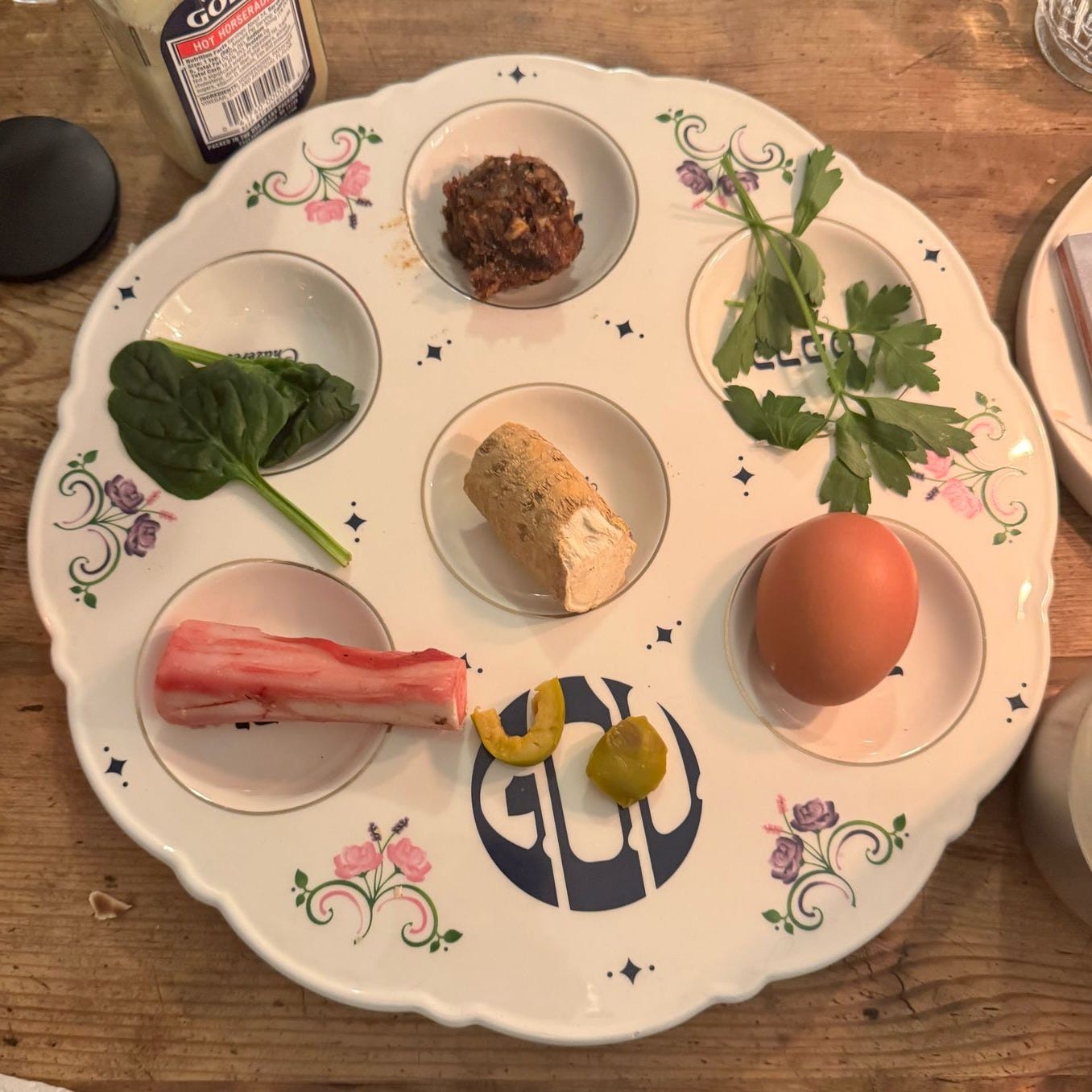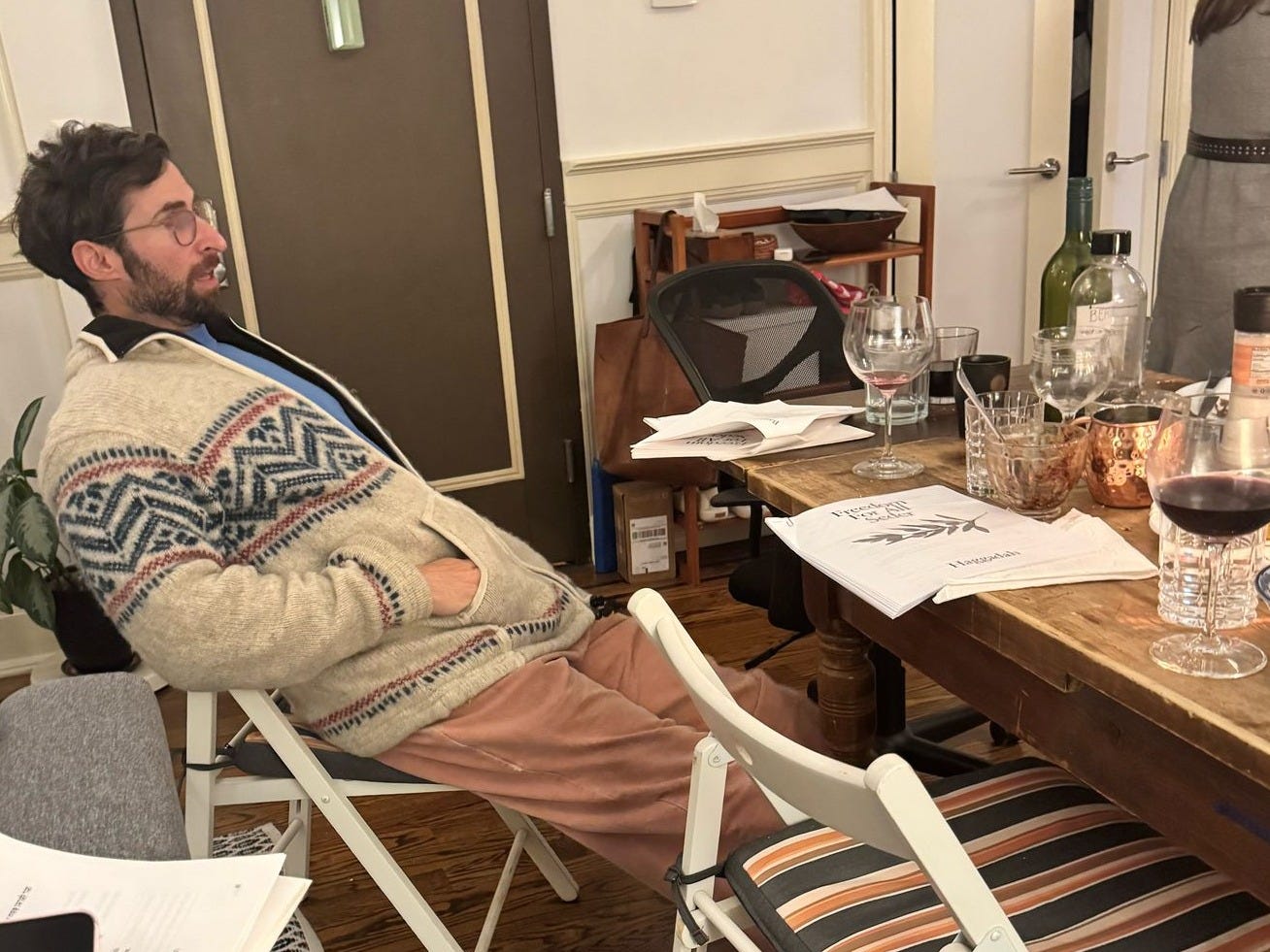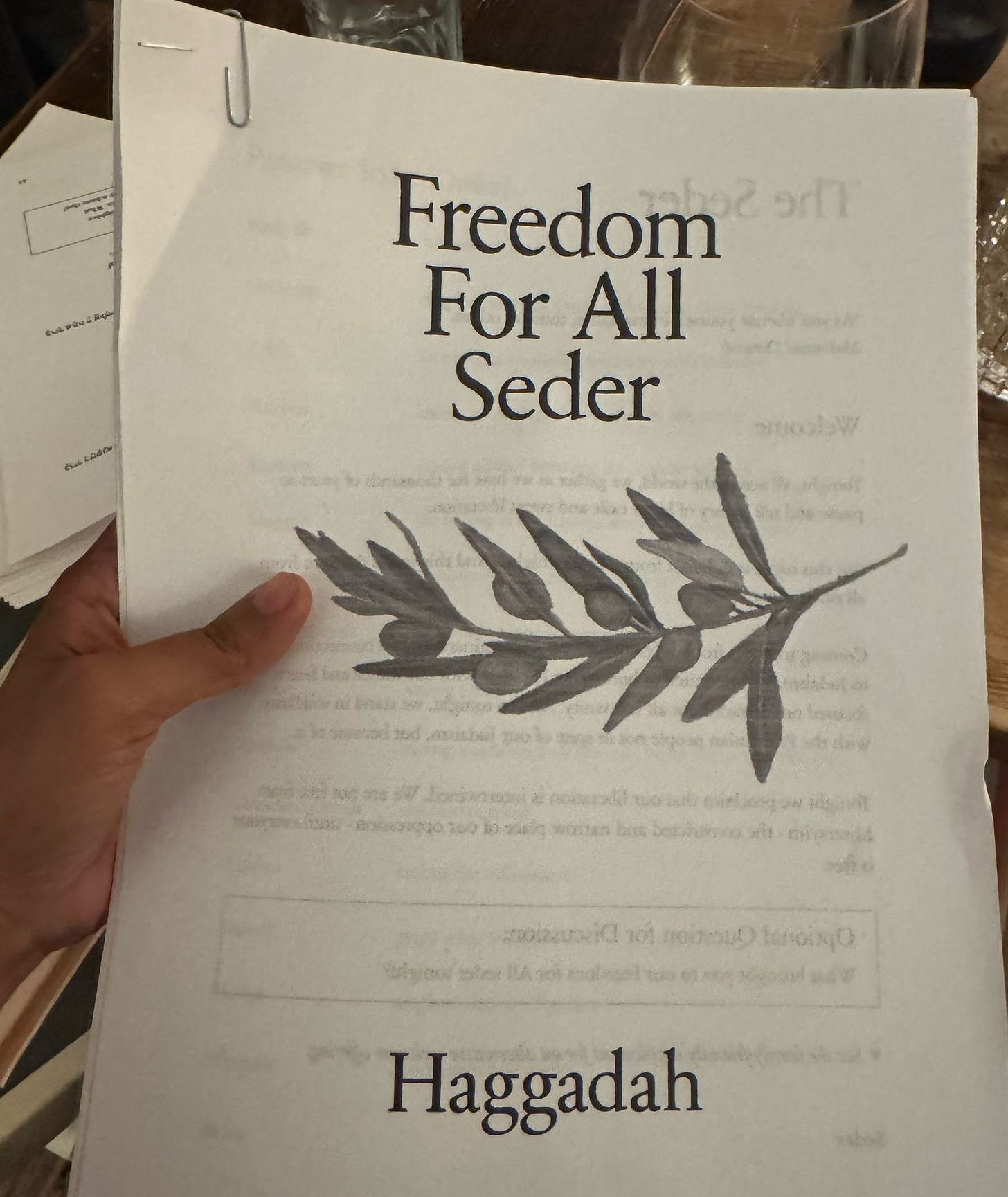043 - 2 Girls, 1 Elijah's Cup
Now that I have your attention, please enjoy my Exodus exegesis
Another Passover has passed us over. Hope everyone remembered to smear their doorposts with lamb’s blood? I haven’t seen any IG stories from friends lamenting the mysterious smiting of their firstborns, so I’m going to assume we’re all good. Yasher koach!1
If I were a lazier writer, I might have called this essay “A Tale of Two Seders.” But this is Rogo’s Modern Life you’re reading. Substack has standards. If I wanted to repurpose a Dickensian title for my own perverse, parodic, K for P intentions, I would have gone with a much deeper cut, deeper even than “Great Exoduspectations”… something like, I don’t know, “Maror Chuzzlewit.”
But the tale I wish to tell does indeed center around the two Seders I attended in this year of our Yahweh 57852 and the glaring contrast between them—a duality straight out of a Dickens novel… something like, I don’t know, Barnaby Rudge.
First Seder
Calling an audible on my perennial plan of spending N1 at my aunt and uncle’s house in Connecticut, Jewlie and I headed to my pal Dan’s apartment in Brooklyn for a small but mighty “FriendSeder” with his partner and two other interfaith couples (we held it down for the Hinjews).

Before going any further, a brief explainer for the gentiles in the room: Seder is a Hebrew word meaning “order,” used as a metonymic stand-in to describe the entire evening’s proceedings—an OCD sufferer’s wet dream featuring fastidious blessings over symbolic foods, repeated hand washings, a boozy table read of the Exodus story, a heart-unhealthy meal of fatty meat and oily potatoes, and a game of hide-and-go-seek with an oversized Saltine for dessert—all neatly delineated into a 15-step run of show known as the Haggadah.
Typically the host leads the Seder and provides their own flavor of Haggadah, from which speaking parts are assigned and the overall tone is set. It has been said that there are as many varieties of Haggadot (plural) as there are bubbles in a bottle of seltzer3 — Amazon returns over 3,000 results including The Haggadah About Nothing and The Office Haggadah: An Unofficial Scranton Seder. It’s even acceptable to cobble several together into a customized compilation, or to compose one’s own bespoke version outright—complete with inside jokes about the red-headed IDF soldier Becca hooked up with on Birthright.
Much like the U.S. Constitution or the Chick-fil-A employee handbook, the Haggadah is a living document—not a static text fixed in ye olden days, but a guide for telling a story whose interpretation and presentation can evolve over time and across communities. As such, I was delighted to be greeted at Dan’s Seder with a Haggadah theretofore unfamiliar to me and my Conservative Jewish upbringing. It was downloaded from the website of an organization called Freedom for All Seder, an international coalition of Jews calling for an end to the violence in Israel/Palestine.
Right out of the gate, this Seder hit different. Before even diving into the table of contents, Dan made a heartfelt declaration of his personal grappling with his Jewish identity vis-a-vis the current state of affairs in Israel, and read the following open letter from the Haggadah’s authors:
For thousands of years across the globe, the Jewish people have celebrated Passover and told the story of Exodus as a reminder that we have not always been free. This year, as we witness continuing violence and destruction of Palestinian life in the name of Jewish safety, it is clearer than ever before: if our freedom is dependent on the oppression of another people, we will never truly be free.
Since the massacre of 1200 Israelis on October 7th, 2023, over 50,000 Palestinians in Gaza have been killed by the Israeli military in an unconscionable act of collective punishment that is continuing into mass starvation. We call for an end to this killing. We demand a permanent ceasefire now, a hostage deal, and an end to siege on Gaza.
This Passover, as Jewish movements mobilizing our communities against the occupation, we recommit ourselves to fighting for true freedom - collective liberation for Jews, Palestinians, and all people.
By celebrating Passover together in a unified, explicitly liberatory way, we say to the world that we stand in solidarity with the Palestinian people because of our Judaism, not in spite of it.
Seemed to me like an extremely honorable, measured statement in service of peace and compassion for all humankind. I was on very much on board! And the more I thought about it, to tell the story of the ancient Israelites (arguably ancestors of modern Israeli Jews) and their liberation from violent and oppressive imperial Egyptian forces (arguably ancestors of modern Palestinians)—without acknowledging the cruel irony of the script-flip playing out in Israel today—would be downright unconscionable.
ARE WE NOT ALL HUMAN BEINGS, OF THE SAME FLESH AND BLOOD, FOR CHRIST’S FUCKING SAKE?4
The Seder continued, with notable au courant commentary and humanitarian-minded wrinkles mixed into the traditional blessings and rituals: an olive added to the Seder plate, symbolizing solidarity with the Palestinian people; the salt water5 representing not only the tears of enslaved Israelites, but the tears of millions of displaced Gazans mourning their dead relatives and destroyed homes—as well as the Israeli hostages and their families who have been equally torn apart.
The conversation was crackling, the kugel was krispy, and the brisket was basted with tender loving and care (and garnished with horseradish gremolata).6 In one final mindful twist, the Haggadah’s closing statement—what I had incanted to conclude every Seder since gaining the faculty of speech as “Next Year in Jerusalem!”— was replaced with the more respectfully nuanced “Next Year in Freedom!”
With all due respect to my Grammy in heaven, Dan and Co. delivered a Perfect 10. Best. Seder. Ever.

Second Seder
For N2, Jewlie and I drove up to Westchester from the city to meet my parents at our local JCC, a Conservative congregation to which my family has belonged for three generations (my dad’s dad, Grandpa Herb, was a founding member, and it’s where my dad and I were both Bar Mitzvahed—and where my Mom was Adult Bat Mitzvahed).
Immediately upon walking into the multi-purpose kiddush room where the multi-family Seder was set—home to one of my fondest childhood memories: watching Scott Norwood go Wide Right in Super Bowl XXV—I could tell I was in for a doozy.
The first thing I clocked—because how could I not?—were two 4’ x 8’ poster boards depicting the remaining Israeli hostages believed to still be alive and in captivity in Gaza—BRING THEM HOME printed in bold type above. Scanning the 60 or so attendees who kibbutzed around the banquet rounds before being asked by the Rabbi to take their seats, I noticed several elderly congregants sporting what seemed to be the same cool, new necklace—some kind of dog tag looking thing that I had never before seen (available on Amazon for $29.00)—mixed in with the more familiar yellow ribbon pins worn in support of the abducted.7
There’s no other way to say it: these folks were hypebeasts for the hostages.
The Rabbi began his Seder in the same hushed tone as Dan had, with a solemn reminder of the daily horror being perpetrated in Gaza: the estimated 22 living innocent Israelis8 who at the time of the Seder had endured their 505th consecutive day of unimaginable physical and psychological torture at hands of their Hamas captors. The brutal details of the October 7th attacks were vicariously relived—beheaded babies and all—before a collective prayer was said for the 30,000 Jews displaced from their homes in the north of Israel, and of course for hostages’ safe return: the primary precondition for meaningful peace.9
I sat strangely enraptured for the rest of the evening, patiently listening and participating in the retelling of a story that we had just heard the night before—don’t worry, it was still fresh!—not to mention every year for the past 3,000 years.10 I picked over the burnt brisket, rock-hard salmon, and slimy chicken cutlets provided by a Kosher caterer in Stamford that charged $90 a head (that’s a lot of bread—for no bread).
As the festivities wound down and I watched my dad struggle to get a forkful of bone-dry “cake” to his mouth before having it crumble into dust and disappear with the sands of time, I’ll admit to getting a little spooked when the Rabbi—a very sweet guy who knows his Torah portions like I used to know my Playmate Data Sheets—shifted into the highest gear of his soul to thunder the Seder’s coda: “Next Year in Jerusalem, the eternal capital of the Jewish People!”
$90 a head is a lot of bread—for no bread
Despite feeling a bit like I had just attended the garden party in Get Out, I genuinely appreciated my JCC’s Seder for its own sake. Here was a tight-knit community, clinging proudly to its minority identity, celebrating their ancestors’ resilience and perseverance in the face of millennia-long persecution—even as they remained consumed by the contemporary suffering of their distant cousins in crisis.
And yet, I couldn’t look past my congregation’s seeming ignorance—willful or unwitting?—of the aforementioned irony inherent in this present political moment. How was I to square my congregation’s deafening omission of the Palestinian plight, a brazen blindspot made all the more obvious to me by my prior night’s presentation?
Isn’t the central ethical commandment of Jewish law to “love your neighbor as yourself”11—what Rabbi Akiva famously called "the great principle of the Torah”? Doesn’t the foundational notion of the “shared divine”12 teach that every human being, regardless of race, religion, or background, is a child of God, created in His own image? Might the fact that “love the stranger / do not oppress the stranger” is the Torah’s most reiterated commandment—appearing 36 times!—suggest that God reeeeally wanted that one to sink in?
It’s worth zooming in on that last one, known as Ahavat HaGer, whose full biblical text from Deuteronomy 10:19 takes us back to the Passover story: "He [God] defends the cause of the orphan and widow, and loves the stranger, giving them food and clothing. You shall also love the stranger, for you were strangers in the land of Egypt."
This isn’t simply an acknowledgment of the foreigner—it’s a moral evolution in calling for love. This isn’t merely a tolerance of the other—it’s an empathy borne from experience and compassion rooted in memory. This isn’t just policy—it’s a deep, spiritual truth.
All kidding aside, I’m more than happy going back-to-back with the Seder. I truly don’t mind running back the same story on consecutive nights, year after year—not just because it’s supes fun dipping my fingies in wine while counting the plagues,13 but because of how those deep, spiritual truths seem to reify with each retelling.
Here’s the truth: It’s not only possible to pray for the hostages and the Palestinians in the same breath, it’s demanded of us by our own Big Guy Upstairs. Here’s another truth: Our Big Guy Upstairs is the same as theirs. And here’s one more for the car ride home: Next Year in Aruba! JetBlue’s got a deal going on.
Old Jewish Man for “Well done!”
The Jewish calendar, as calculated by “Rabbinic chronology,” asserts that the entire world was created 5,785 years ago (give or take a few days). I know a trilobite or two who might agree to disagree...
No it hasn’t… but since I just said it, consider it ‘having been said.’
See what I did there, with Christ? This is what’s known as comedy.
Into the salt water is dipped karpas, a green vegetable symbolizing spring, new beginnings, and the abundance of the land, giving us the Passover remix of WAP: Wet-Ass Parsley
It just hit me how much the ‘horse’ part of ‘horseradish’ has pulled focus in my life—to the point where I am only now fully realizing that horseradish is a root vegetable. Every time I’ve previously encountered the word I would immediately get lost in a beautiful daydream of wild mares striding through a mountain meadow—I’d never get to the radish.
Not to be confused with the yellow ribbons worn in the name of bladder cancer awareness.
According to a report by The Jewish Link, there are actually 24 hostages presumed to be alive in Gaza, but one is Thai and one is a Nepali—so they don’t count.*
*According to the synagogue’s posters.
“If only Hamas would release the hostages, this would all be over!” History would say otherwise…
But hey, it’s a good story. And I love those Four Questions! I’d be ok if we added some more, even. Make it a six-pack? What about a Bakers’ Dozen? Can get ChatGPT to come up with them (seven seconds later):
Q5. Why do we dwell on the same, single instance of our ancestors’ oppression, when there has been soooo much other stuff to complain about since?
Q6. Why is the Seder always led by someone with zero personal experience of actual slavery?
Q7. Why do we call it the "Festival of Freedom," when it could use a much cooler name like “Liberationpalooza,” or even just like “FreedomFest”?
Q8. Why do we have to go through all those unnecessary steps like washing our hands and making weird little sandwiches when we’re just here for the macaroons and wine, am I right people?
Q9. What’s all this talk about bondage, and why is it turning me on?
Q10. Why do we still hope for the coming of Mashiach, when it’s likely he’s already been killed in an errant drone strike?
Q11. If our freedom is so precious, why insist on doing all the verses to Dayenu?
Q12. Why place so much emphasis on the past, when we can barely keep track of what happened last week, am I right people?
Q13. Why even bother asking all these questions, when we all know the real answer is: “Because they had a deal going on!”?
Leviticus 19:18, for those keeping score at home.
Tzelem Elohim (Genesis 1:27), like you didn’t already know.
Anybody else get a little too excited by that final intonation of Makkat Bechorot?



